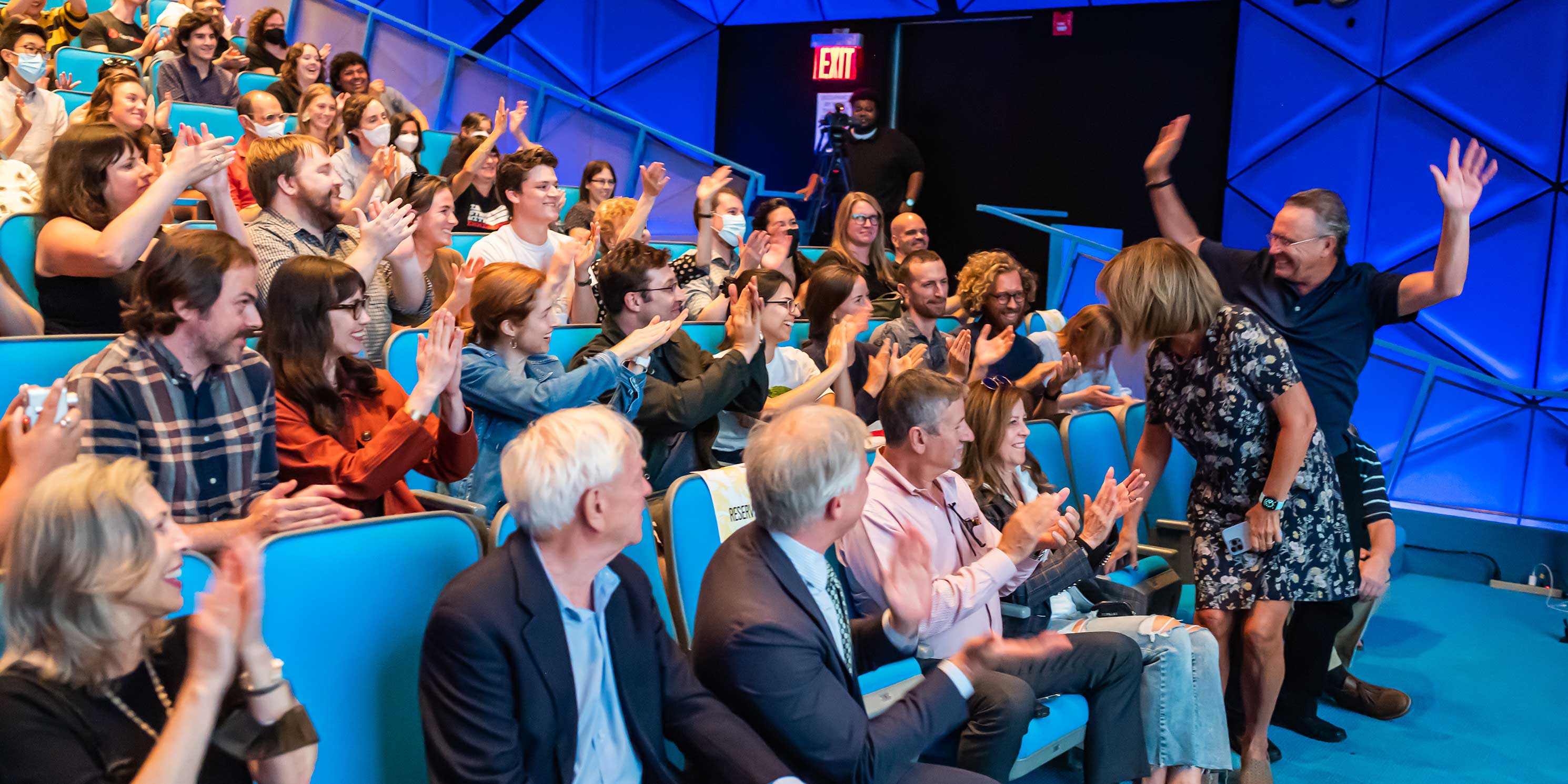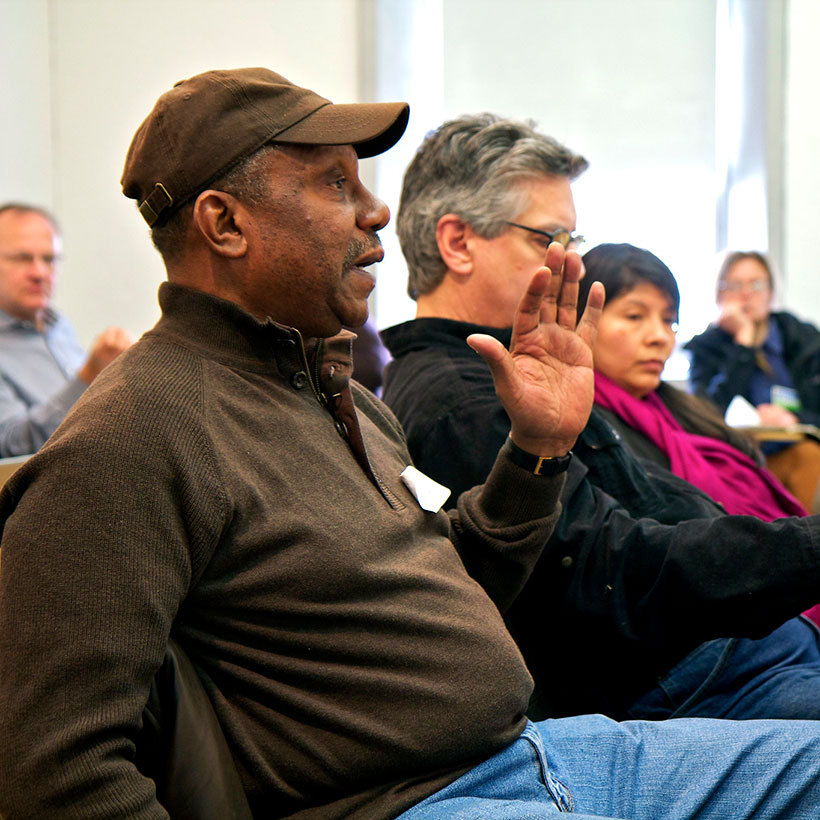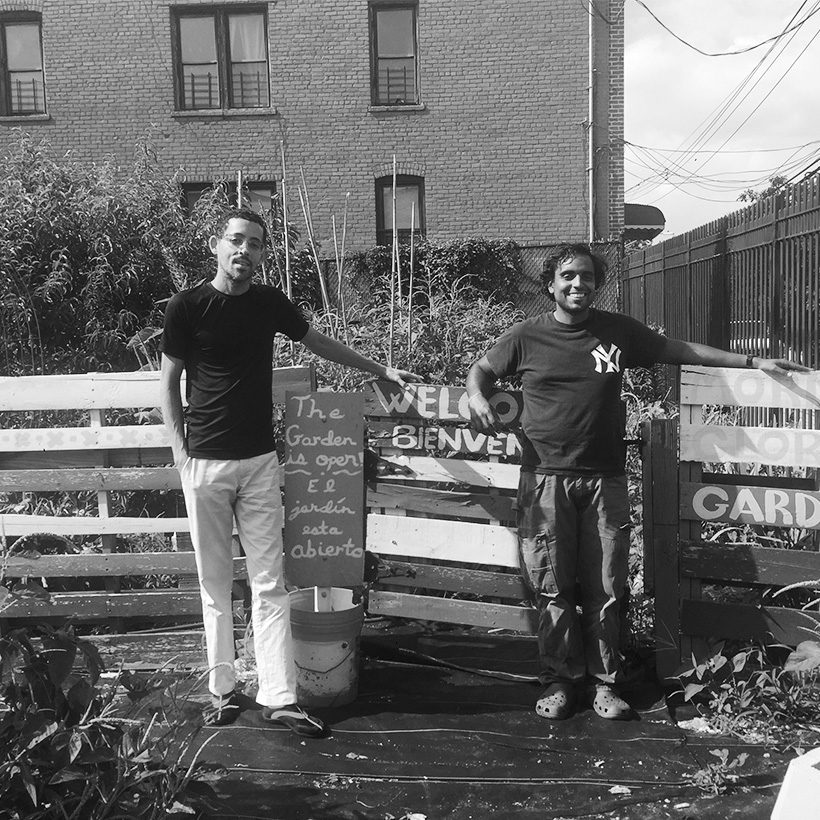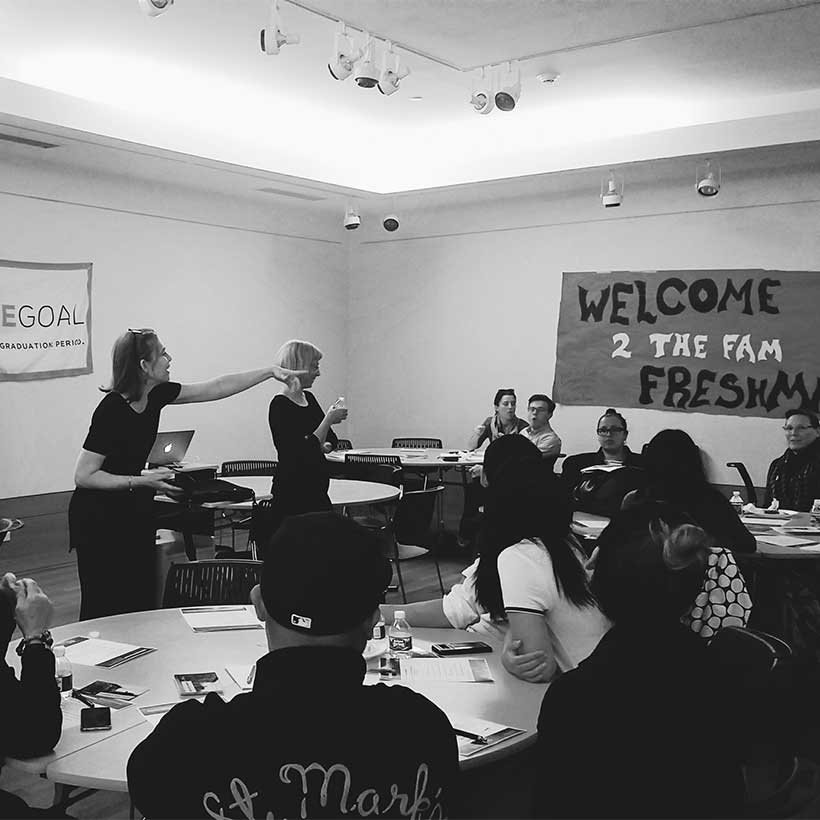Featured LNP Partner: Chinatown Soup!
An interview with Founder and Executive Director Michelle Marie Esteva
In July, MAS completed its 2022 Livable Neighborhoods Program (LNP) Summer Cohort series. After receiving more than 80 applications for the program, a set of twenty local advocates were chosen to participate in the program. The cohort included architects, educators, community board members, and active members of local advocacy groups and tenants’ organizations. Together, they engaged in workshops about zoning, land use and environmental review, publicly-available data and web tools, and strategies for involving neighbors in community-based planning.
We are excited to highlight one of our Livable Neighborhood Program partners from the 2021 cohort, Chinatown Soup! Chinatown Soup is a grassroots community space for local artists, “advancing art, justice, historical preservation, and civic engagement in downtown New York.” MAS awarded Chinatown Soup an LNP to support ongoing conversations about place in their neighborhood. Chinatown Soup created a T-shirt to capture some of the changing sentiments about #dimessquare as a new destination as social media and food blogs. Their curation brings into question how a district gets formed and branded and what culture persists, even if it is overlooked.
Learn more about this “wearable zine”>
Earlier this year Eliza Jacobson, a Community Engagement Intern for MAS, interviewed Michelle Marie Esteva, Chinatown Soup’s founder and Executive Director. A transcript of the interview follows.
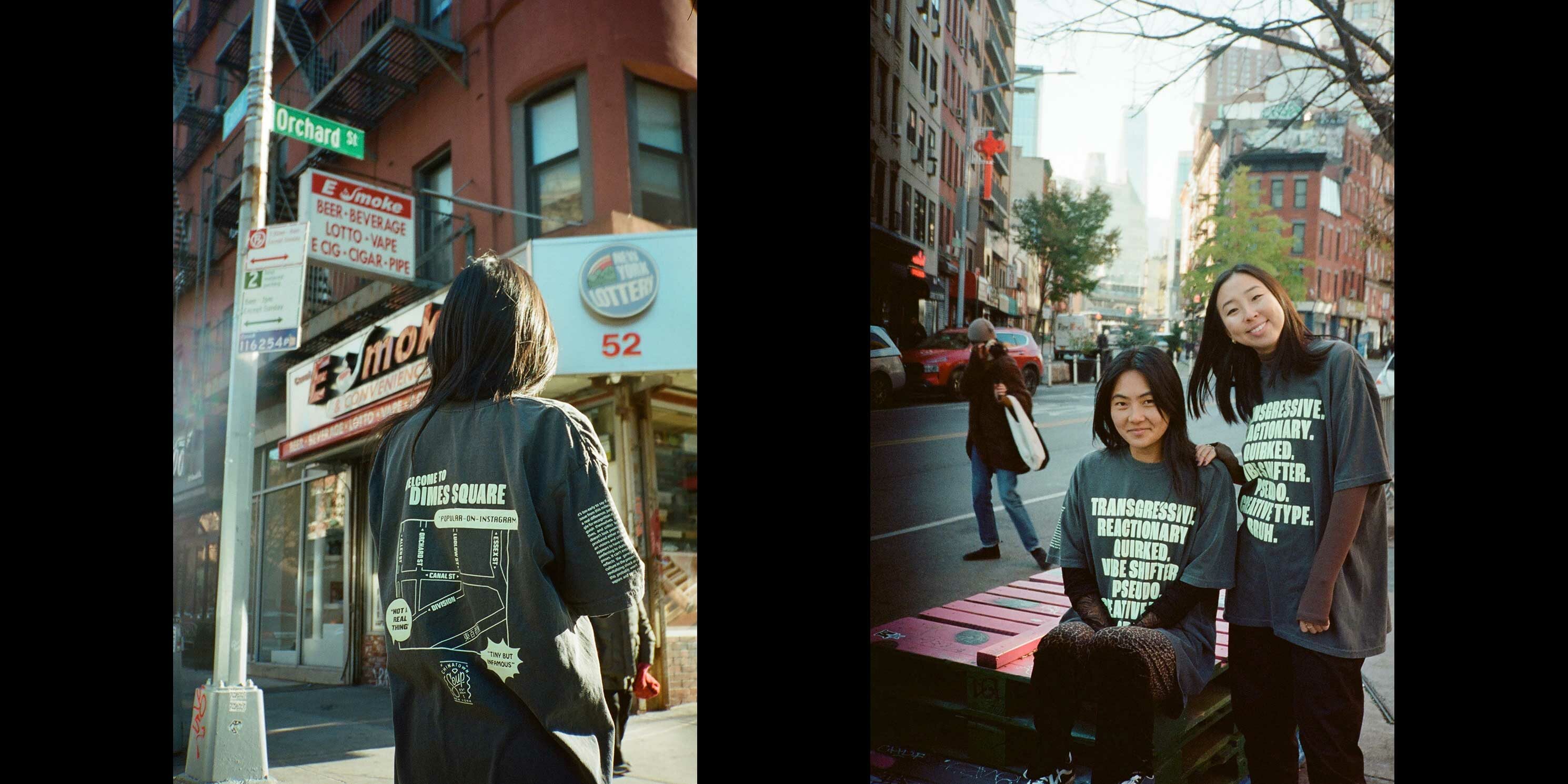
Eliza Jacobson & Michelle Marie Esteva in Conversation
Eliza Jacobson: Thank you so much, Michelle for joining us today. I’m excited to be able to chat with you. I want to know how you got into the work that you’re doing.
Michelle Marie Esteva: Sure. Thank you so much for thinking of me to have this conversation, and it’s an honor to be considered by the Municipal Art Society. I think of MAS, you know, as the institutional keeper of Jane Jacobs’ legacy and she’s so my heroine-I studied her work as a grad student and during my time doing that I also imagined Chinatown Soup. It was never supposed to be an actual living breathing space or place, and it’s become that. We’re in our eighth year now so (it) feels like so much has happened, and in such a condensed period of time, so it still kind of blows my mind, in that way.
Eliza Jacobson: Yeah, can you talk about the origins of Chinatown Soup and how it started, and what inspired you and maybe a little bit of background of what exactly it is.
Michelle Marie Esteva: Sure, yes, so I was in grad school working as a teaching assistant for a class called Chinatown and the American Imagination, which involved me putting together walking tours and leading students around the neighborhood with a special emphasis on the work of Jane Jacobs and preserving Lower Manhattan as it is today. So that’s really how I got immersed more in Chinatown and what it’s been in the past, what it is right now, and where we can conceive of it going in the not-too-distant future. So out of that experience Chinatown Soup became this imaginative exercise of how a place could contribute to the evolution of such an originally defined neighborhood that is clearly in the process of change.
Eliza Jacobson: Yeah, definitely, and so how did it come to be in the way that it is now?
Michelle Marie Esteva: I submitted it as a grad school assignment as a business plan, and I was surprised by how many people in my class thought that it was feasible. I interviewed the current leader of Detroit Soup, which had begun in Detroit as a micro-funding dinner back in 2010 to support local art projects and has since blossomed into its own freestanding place for dinners like that, and I think a few other Soups that were pop up projects have appeared around the world. And Amy Carl was so encouraging about starting your own soup in New York and I thought, “that’s wild-no one pays you to occupy real estate in New York City, it’s a completely different game over here,” but I just felt compelled to see what I could do. We launched a Kickstarter based on the plan for Soup, and one thing led to another, we found the space and we took it took it from there.
Eliza Jacobson: So, can you talk a little bit about some of the programs that you run and what the focus of Chinatown Soup really is.
Michelle Marie Esteva: Sure, well our mission statement defines us as a creative community, which I think is an all-encompassing wonderful way to express our approach to the type of, if you want to call it advocacy work, (advocacy work) that happens from soup and through soup. So, our main points of focus are art, first and foremost this idea of justice, historic preservation and civic engagement. Those are the pillars of what Soup really seeks to address.
Eliza Jacobson: Hmm… and out of the physical space, because you mentioned that Detroit soup and some other Soups across the world might be more pop up based, what comes out of having your own place?
Michelle Marie Esteva: I think in New York we’re so saturated with pop-ups and, to a large degree that’s out of necessity because it’s really hard to afford commercial space, so that in ways marginalizes artists and especially artists engaged in activist work, sort of localizes all of that in institutional formats, which you know there’s nothing wrong with institutional formats, and MAS is a great example of how that’s enduring and so significant and relevant and needs to still be here, but in terms of self-organizing communities, occupying real estate really gives us a sense of longevity and a sense of home-really a sense where we can gather and feel comfortable and feel like what we’re doing is real and tangible.
Eliza Jacobson: Yeah absolutely. Before learning more about you from Spencer and the Livable Neighborhoods Perspective I thought Chinatown Soup was (just a) gallery. I did not know that you’re doing so much more in the community and looking at your website and doing a little more research, the main thing that popped out to me was providing a space for art outside of the art world. I was curious if you could talk a little bit more about what that means, and the importance of that.
Michelle Marie Esteva: Sure. I’ve made it a point through Chinatown Soup to stand for artists who are advocates and who are sort of defined in advocating for themselves beyond just the work that they make, but also communities that they come from. I think it’s essential to advocate for artists who are advocating for others who cannot advocate for themselves, so in this way art at Soup becomes more of a medium for a social art, and it’s more like a social experiment in many ways, and a broader canvas than a traditional commercial gallery, which is limited by the need to sell, make money, profit-which is all well and good, but that doesn’t allow for what we’re calling advocacy for the purpose of this conversation.
Eliza Jacobson: Yeah absolutely, and I’m also curious about the location of Chinatown. Was your introduction to that space through the tours that you lead, or had you been engaged before? And also on top of that, how are you engaging with that community through Soup? What are some ways that that happens?
Michelle Marie Esteva: I was born in New York, so of course I had been familiar with Chinatown, though not living there and spending the majority of my time there for most of my life. When I was very young, that was probably my first introduction to Chinatown and in many ways, you’re not from Chinatown and you’re still a New Yorker (but) it can even feel like you’re a tourist in your own city just based on the history of the place. (How it’s opening up now and becoming more intermingled for the first time in quite a long time for a lot of different reasons.) But I guess I must have walked by Soup a number of times on my walking tours and never really noticed it- it was a dingy storefront. The landlord Mr. Chan, I still can’t believe he trusted me at 25 with no job and no income to take the lease, but the space came as is, so we put lots of love and effort into turning it into Soup and that was part of the fun, too. I think really having Soup be a process driven rather than a progress obsessed project has helped me appreciate what it can do and be more receptive and opening the doors to people from the neighborhood and people from elsewhere who think of New York and specifically Chinatown as a neighborhood that they’re inspired by and want to contribute to through their art really having that be accessible is important. And Soup is designed as a call and response, so we’re not didactic, we’re not coming from a place of agenda or a language of politics, we’re really listening and sort of sensing what it means to build community within a neighborhood and that keeps it pretty free, which I think is so important, and maybe not so common these days amongst cultural art spaces.
Eliza Jacobson: Definitely not. I also saw that you do work with zines and shareable art. I was wondering if you could touch on that a little bit and talk about the power in that type of art that maybe a lot of people don’t know about.
Michelle Marie Esteva: Sure. The zine wall started at Soup in 2017 and the art and practice of making zines has always been associated with sort of like this Anarcho underground artists culture, right, and it’s been a great way for people to communicate with each other and to challenge each other and not have to use more mainstream channels of communication to get their points across.
We have right now a Chinatown centric zine archive that we’re super dedicated to building up. More people come by and drop off zines from time to time and we add them to our library, so we have those available for folks to read. We also produce original zines through what we call “Alphabet Soup” which is an in-house publishing arm for creatives who want to make zines and talk about whatever is making them mad or sad or topics that they feel people should pay more attention to- or hot takes because zines are great for that. I mean the zine wall really is part of the many, many Chinatown-centric projects that we’ve welcomed over the years and, as you’ve done, anyone interested can check out our website. There’s a Zine Soup page. We have a Zine Soup highlight on our Instagram to peruse the memories of what we’ve done and are continuing to do.
I would say, even thinking more about your previous question about how Soup is locally embedded, I think fundraising for local food security initiatives has been the primary focus of our most recent outreach efforts. Those have involved zine making, like recipe books and bringing local or farm ingredients from upstate to include in recipes. It’s been a fun exercise. We had a fundraiser with Canal Cafeteria, and we’ve also raised money for Heart of Dinner- Moonlyn and Yin are just exemplary advocates for the elderly in Chinatown. It’s incredible how far a hot meal made with a little bit of love can go, so we fundraise for them. We brought together local punk bands to put on a benefit concert and artists made clash posters and people bought them and listened to music and that was a fun night for sure. That’s been most recently, expanding 2020 through late last year.
But I think ultimately what is of utmost relevance to the idea of preserving community in our conversation is the fact that we are a Chinatown-based grassroots artistic collective and we deserve our right to exist and persist in our own way, and we’re part of the local landscape going on eight years now, so everything that we do to uplift and center the folks who believe in Soup, you know, how we’re being ourselves here is at that same time supporting the culture of Chinatown in a new and meaningful way.
Eliza Jacobson: Heart of Dinner is amazing. I’ve worked with them too and they’re fantastic, so that’s a great partnership. You also mentioned preservation as part of your core mission. I was wondering if you could also talk a little bit more about what that means for you and for Chinatown Soup as well.
Michelle Marie Esteva: Of course, I think of Jane Jacobs when I think of a model advocate who’s grounded in the work of preservation and I think about her being unapologetic and brave and not conforming and not complying and, as we open the conversation acknowledging her actions that delivered us Lower Manhattan -including Chinatown and the preservation of this neighborhood, of my neighborhood most especially as it is today. And for me engaging in that line of advocacy or activism demands, as I said, surrendering to process rather than striving for progress. Thinking of preservation, in terms of the space to do that which has its own positive affirmative results rather than what we’ve seen happen in Soho which is preserving the facade of these beautiful cast iron buildings and then filling them with commercial spaces. So that’s sort of a warning lesson and I think a big takeaway from the legacy of Jane Jacobs and what thoughtful preservation seeks to achieve is this idea that cities are for people, not consumers or zombies. They’re made by us, by a congregation of new people with souls-individuals, and I hope we can hold on to that. I see Soup creating a place for that.
Eliza Jacobson: That’s so true. Soho is so gorgeous and then there’s Zara and H&M, and it doesn’t fit.
Michelle Marie Esteva: Pretty dystopian.
Eliza Jacobson: Chinatown I think even recently, and since the beginning of the pandemic has really been struggling, or it’s talked about so much- the challenges that are particular to the neighborhood and so I think that it’s such a great place for this type of community collective and space to be in. Especially now, it seems like it’s even more important. Has that been something that you’ve felt through the work that you’re doing?
Michelle Marie Esteva: Sure, people are hungry. People line up for food outside our door. And so, that was an impetus for us to really make the effort to support local food security initiatives as it’s happening in a visceral way. We can see it from our front door. Chinatown has been struggling for a while and I think COVID exacerbated, or the period of COVID, exacerbated a lot of pre-existing hardship there. People are newly tuning in to a long-standing struggle in the neighborhood for sure.
Eliza Jacobson: So, you’ve talked a little bit about partnerships and lifting up other groups that have similar values and missions as you. I’m wondering if there are other things that you consider effective tools of advocacy, or any ideas or concepts that you think make an effective advocate.
Michelle Marie Esteva: It’s funny, I watched a movie [The White Countess} the other night that reminded me possibly of what inspired me to open Soup and follow through this pathway of what we’re calling advocacy. It’s an early 2000s film set in pre-war Shanghai about a blind American and a Russian refugee, the screenplay is written by a Nobel Prize winning writer, Kazuo Ishiguro. People say it’s not his best work, but I enjoyed it. I was totally there for it. And the American in the movie is speaking to his friend Mr. Matsuda about realizing his dream (of) opening (a) speakeasy with an element of what he calls “political tension,” which I think he says, this would be elevated above the level of mere confection which, when I first opened Soup, I thought, “how can I make this more than a gallery? This is bigger than that.” So, I really started listening to the dialogue in this movie when this conversation began, and they go on to have this great riff on gathering the disparate groups of Shanghai’s international culture, you know people from all walks of life, inside the space to create something quite wonderful. I think Mr. Matsuda puts it that way, and then {the American goes on to describe the dream of making this little miniature as the creation of an orchestra so sort of as its own art form and, for me this all tracks.} And obtaining the fifth element at Soup which the movie calls “political tension,” I would probably rephrase or define as “radical acceptance,” which for me is based on questioning the status quo (and) embracing fundamental differences, first and foremost, of thought.
And our artists-in-residence at Soup Studio come to mind when I start thinking about this, and what first comes to mind, of course, is the personal aesthetic of their workstations, which is a photography series waiting to happen-actually we should do that, a studio postcard series because they’re also representative of their personalities. It’s wonderful to see them all together, but staying with this idea of radical acceptance, I mean, when you think of the different types of residents who are at Soup, all different racial backgrounds, ethnicities, all different mediums of art, which is, you know, even more compelling. If we’re going to think about even COVID, all different ideas about COVID vaccines too, so people sharing space who don’t necessarily agree on that. Different ideas that in mainstream discourse are sort of used to divide people just don’t seem to matter at Soup. I’ve made it a priority to curate shows that put people from different backgrounds together.
Even over the past year we’ve sort of been on a roll. We had a really fun show in November 2020 and a trans woman artist and a cis woman teamed up for an exhibit that made fun of Jeffrey Epstein and sort of wonders about men who want to give birth.
Over the summer, a Palestinian artist curated a Zine collection of “Free Palestine” reading materials, and we continue to host our intergenerational group of Jewish neighbors for Shabbat potluck. You know, we talked about the local punk bands playing a benefit concert to help feed the Asian elderly. Also, over the summer. there’s a dissident Cuban collective we’ve worked with a number of times, and they called out Black Lives Matter while we were providing water and snacks to protesters. I mean, that’s really, those are just some examples of Soup in action. On being a microcosm of our messy human family it works, because we’re just making art together and for me good art sort of seeks beyond these differences, you know. Of course, it acknowledges them and celebrates them. But it really it seeks beyond that, and I find that perspective is hard to come by these days.
Eliza Jacobson: Yeah, I was gonna say I really don’t know of many spaces where so many different people are not (only) welcome but represented and working together, and that’s pretty amazing that you’ve, you know, fostered this space where that can happen. But art does connect people, art and food.
Michelle Marie Esteva: The great equalizer Yes, art and food-more of that!
Eliza Jacobson: For sure absolutely. So that’s really special and you know so many different people represented there. Is there anything, I’m curious, if Soup didn’t exist, things that you feel have changed since Soup became part of the neighborhood-although you did just say that beautiful example. But yeah, I mean anything else that stands out for you.
Michelle Marie Esteva: Sure. I mean, I think what’s definitely become more dominant is this practice of social justice culture and I’ve navigated turning away from that. Especially, you know, when it comes to conversations surrounding contemporary cultural arts advocacy in that realm. Because from what I’ve experienced, it performs solidarity at the expense of what to me is authentic expression and outcomes that lift everybody up together. And prevailing notions of what it means to be a good activist locally, and I think globally-let’s see-they equate responsibility with shame and oftentimes representation with what could be construed as racism, just this hyper fixation on the exterior and equality with exclusion.
So, from my point of view there’s nothing redemptive about this phenomenon. And to me it’s sort of an ironic inversion-it’s dystopian-and I wonder how we can respect one another if we’re afraid of one another, afraid of saying the wrong thing or trying to be people that, inside, our inner dialogue really isn’t. That sort of attachment to guilt and fear don’t inspire me and for much of what I’ve witnessed this trending social justice version of advocacy activism-it doesn’t create safe space, it shrinks space, it suffocates, it silences, and you know deviations from these narratives that feel pretty heterodox.
If you defect from these rules of engagement, you know as an advocate or an activist, you can be threatened with a cancellation campaign, and these feel like police state tactics, coming from a movement that claims to oppose the police. So, I’m just kind of baffled and I can’t in good conscience jump on that bandwagon and hold space for a conscious community under those terms. There’s so many other ways to understand the reality and struggle against racism and oppression. And for me, and you know for Chinatown soup, “identitarianism,” any ISM, you want to look twice at.
But this “identitarianism” that dominate social justice culture discourse for me doesn’t have a monopoly on the struggle to oppose racism and other attendant issues, and it doesn’t represent the perspectives of all radicalized people. And Chinatown Soup is, I think, a living demonstration of an alternative lineage of advocacy and thought that works to oppose racism and really foster something new, rather than living in this binary state of conflict all the time-it’s exhausting. Yes, that’s me being candid.
Eliza Jacobson: No, and thank you because I think that’s important, and I think that shapes the radical acceptance of all different groups of people in the work that you’re doing and that’s really important, so thank you for being candid.
I’m curious, because it’s kind of a unique space that you’ve created, if there are challenges that come up with this radical acceptance, if that can pose a challenge as well.
Michelle Marie Esteva: Totally. Recently, if I can give an anecdote if you want to hear a recent example of this, this question in action.
Eliza Jacobson: Absolutely yeah.
Michelle Marie Esteva: Sure, a person came in who was recommended to Soup by a longtime neighbor friend of ours who himself is a person we’ve collaborated with. He was one of the first to advocate on behalf of Chinese American artists in Chinatown decades ago, so real OG awesome human. And this person who came in asked me who was in charge of Soup, and my partner from Hong Kong was standing next to me, and he laughed and he told this person his favorite line to say, that I’m (Michelle) the boss, which he enjoys doing because he knew that it irks me. It’s very much its own boss, I’m just along for the ride. That’s my philosophy/ management style, whatever you want to call it. Anyway, this person then asked me if Soup was qualified to be an Asian American art space and that felt limiting and ultimately irrelevant, so I think I responded something to the effect of, “we’re not fond of labels here and Soup is for everyone,” which made this person frown and walk away-imagine that.
So, to your question, I mean I’d say that identity politics, you know, really against me and us and everyone who values authentic diversity, which for me is predicated fundamentally on inclusion, that doesn’t seem to sit well with some folks.
Eliza Jacobson: Yeah, I mean, that he didn’t even want to engage any further to maybe learn more…
Michelle Marie Esteva: Right, we can all learn more (laughs).
Eliza Jacobson: Of course, I mean life is constant, you know, you’re learning every day, and especially because of the work and the incredible diversity and inclusion that you were speaking of, the space and the collective. That must have been somewhat frustrating to not be able to share that but…
Michelle Marie Esteva: Yeah, I mean I don’t take myself seriously like this is who I am at my core, “I belong to the socio-cultural group belief nationality.” That’s never really crossed my mind to think of myself or align what I do with that approach, because that separates me from you-I think separation is a seed of violence, whether that’s thought or action or whatever other sort of negative destructive feeling we can think of, usually originates in this idea of separation. And being together doesn’t mean being the same. For me it’s really that simple. Making someone else’s existence a little bit easier, a little more fun sharing. It’s that simple.
Eliza Jacobson: Yeah, and to separate seems to also halt change because you can’t come together, so that is important to remember. Great well, thank you, I really appreciate your candidness. I am curious, and this is something that we’ve been asking everyone, and then maybe even again important in Chinatown, but because things are changing rapidly In New York if there’s something you feel connected to that you hope doesn’t change- I’m sure there’s many things.
Michelle Marie Esteva: I think places like Soup that exist outside commercial frameworks of doing things that become self-organizing communities, those are places that are critical to livable neighborhoods and I’m so grateful to still be able to experience the reality of these places, you know far and few between, but still here in New York-and people come in from all over the world, I mean New York is a global village. Soup has become a microcosm of that ideal, and that’s sort of the beauty of doing advocacy work here in Chinatown in particular, it’s just intermingled intergenerational local global that residents of this place that makes the work possible also, I think, demands that it continues. And people stop by from elsewhere, they always ask, “Oh, can you recommend another place that feels like New York” and I’m increasingly hard pressed to do that. So, I hope we can hold on to that.
Eliza Jacobson: Yeah absolutely. Me too. And I think my last question, as of now, is more focused on the Livable Neighborhoods Program, and I’m curious to know of anything in particular you learned or experienced that stuck with you.
Michelle Marie Esteva: I think attention to form is so important and even architecture, which is often sort of dismissed as an intellectual lofty profession, but again, going back to our example of Soho we’ve seen you know what the potential of architecture for greatness and also, if we want to think of what’s happened to it today, decay, I would say so, keeping that physical built environment element front of mind. I mean Jane Jacobs focused on this to do her work, sort of the perfect city village is five stories tall, right, and Orchard Street where Soup is is exactly that and preserving that structure going forward for people to inhabit these places and interact with each other and really build their lives, rather than build commerce, or you know, what we call the economy, I think that’s front and center. And an institution like MAS is really well positioned to make people aware of that interaction between built environment and culture, real estate in many ways does determine culture and we’re definitely fighting some battles on that front, you know, as we speak today.
Eliza Jacobson: Mm hmm, absolutely. Well thank you so much! Is there anything you’d like to add that I failed to touch on or bring up?
Michelle Marie Esteva: I’m just so excited I got to talk about some things that I’ve never gotten to talk about publicly before, so I really appreciate you creating space for us to have this kind of dialogue-it’s important, and I hope more people will join us in carrying the conversation forward so thank you so much.
Eliza Jacobson: Thank you so much. That was really eye opening and inspiring so thank you!
